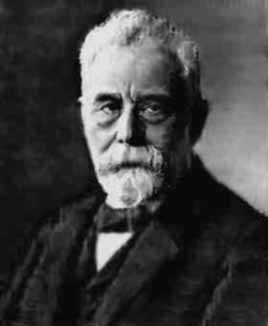
Wilhelm Lexis
 المؤلف:
Wilhelm Lexis
المؤلف:
Wilhelm Lexis
 المصدر:
Neue Deutsche Biographie
المصدر:
Neue Deutsche Biographie
 الجزء والصفحة:
...
الجزء والصفحة:
...
 22-12-2016
22-12-2016
 1116
1116
Born: 17 July 1837 in Eschweiler (near Aachen), Germany
Died: 25 October 1914 in Göttingen, Germany

Wilhelm Lexis attended the University of Bonn where he was awarded a degree in mathematics and then went on to write a thesis on analytical mechanics. He graduated in 1859 and then went to Heidelberg where he undertook research in Bunsen's chemistry laboratories.
Despite the fact that his training up to this point had been a broad one, in 1861 Lexis went to Paris to study social sciences. These studies led to his first publication in 1870 which was on the export policies of France. Heiss writes in [4]:-
This work displays the feature that characterises his later economic writings: a scepticism towards "pure economics" and towards the application of supposedly descriptive mathematical models which have no reference to economic reality. Even in this early work he insisted that economic theory should be founded on quantitative economic data.
In 1872 Lexis was appointed as professor of economics at the University of Strassburg. He held this post for two years and during this time he worked on his second major publication on the theory of population which was published in 1875. By this time, however, he was in Dorpat having been appointed to the chair of geography, ethnology and statistics in 1874. Again he held this post for only two years before he was appointed to the chair of economics at Freiburg.
It was in Freiburg that Lexis made his major contributions to statistics. Zabell writes in [8]:-
Dissatisfied with the uncritical and usually unsupported assumption of statistical homogeneity in sampling, often made by Quetelet and his followers, Lexis devised a statistic Q, now called the 'Lexis ratio', to test this assumption and demonstrate its frequent invalidity.
From 1876-79 Lexis studied data presented as a series over time. He initiated the study of time series with his 1879 article On the theory of the stability of statistical series.
Lexis required a binomial dispersion for his series to be stable and this ruled out most interesting series. However it applied to the problem of year to year fluctuation of the sex ratio among children born in a city. It posed the question of whether an empirical index of dispersion is consistent with the assumption that sex is governed by a simple chance mechanism. As Stigler writes in [5]:-
Many scientists attempted to adapt probability-based methods to social science problems, including Quetelet and Lexis, but in the end they were frustrated, Quetelet because his methods were too insensitive to segregate his data into categories amenable to statistical analysis, Lexis because his binomial models were insufficiently rich for interesting applications.
After what is not much more than a three year period working on statistics in Freiburg, he began to produce a series of papers on economics. Lexis left Freiburg in 1884 to take up the chair of economics at the University of Breslau, then in 1887 he made his final career move when he accepted the chair of political science at Göttingen.
Rather than concentrate on any one of his diverse interests as his career progressed, Lexis studied and wrote on a wider and wider collection of topics. In addition to studying economics, the theory of population, and statistics, he also worked on the production of an economic encyclopaedia, edited a series of works on education in general and university education in particular, and was the director of the first institute of actuarial science in Germany.
Books:
- Wilhelm Lexis, Neue Deutsche Biographie (Berlin, 1952-).
Articles:
- A A Chuprov, Wilhelm Lexis, Izv. Akad. Nauk Pgd. VI 10 (1916), 1789-1798.
- S Gutiérrez Cabria, Development of statistical inference from its beginnings to the beginning of this century (Spanish), Estadist. Espanola No. 98 (1983), 9-29.
- K-P Heiss, Wilhelm Lexis, International Encyclopedia of the Social Sciences Vol 9 (New York, 1968), 271-276.
- S M Stigler, The measurement of uncertainty in nineteenth-century social science, in The probabilistic revolution Vol. 1 (Cambridge, MA-London, 1987), 287-292.
- S M Stigler, The History of Statistics. The Measurement of Uncertainty before 1900 (Cambridge, Mass.-London, 1986), 222-.
- L von Bortkiewicz, Wilhelm Lexis, Bull. Int. Statist. Inst. 20 (1915), 328-332.
- S L Zabell, Wilhelm Lexis, in N L Johnson and S Kotz (eds.), Leading personalities in statistical sciences (New York, 1997), 305-307.
 الاكثر قراءة في 1830to1839
الاكثر قراءة في 1830to1839
 اخر الاخبار
اخر الاخبار
اخبار العتبة العباسية المقدسة


